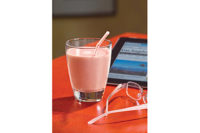Add anti-aging ingredients to dairy
How do dairy foods slow the aging process?

If I’d known I was going to live this long, I’d have taken better care of myself.” –Eubie Blake, ragtime pianist and composer, age 100
Spoiler alert: I don’t have the antidote to aging, nor does anyone. But there are ways to feel better as we age and possibly live a little longer.
Paradoxically, as we continue to age, the science of anti-aging is in its infancy. Researchers have increased the lifespan of mice by manipulating genes that regulate insulin and also by significantly decreasing food intake. By discovering mechanisms that control aging within animal cells, some experts hope to develop therapies to substantially slow aging in humans.
It’s complicated, of course. “Genes define our susceptibility to disease and the aging process, but how much of that is manifested depends on specific environmental factors interacting with genes throughout development,” explained Dr. Artemis Simopoulos, president of The Center for Genetics, Nutrition and Health, Washington, D.C.
Feeling good as we age
Much of what scientists know about humans and aging comes from studies of individuals and populations experiencing long, healthy lives. The New England Centenarian Study found that almost all people who reach 100 are lean (particularly men) and don’t smoke. A healthy weight, regular exercise and not smoking are among the most effective ways to control chronic inflammation — a condition that may play a significant role in the development of many chronic diseases.
In Okinawa, people live about six years longer than Americans and have the lowest rates of heart disease, stroke and cancer. Okinawans consume a diet rich in fruits, vegetables, grains, soy products and seafood. Other lifestyle habits include a focus on family, not smoking, frequent moderate physical activity and social engagement. The Mediterranean lifestyle is also linked to health and longevity.
Enjoying dairy foods promotes overall health and may reduce the risk of several chronic diseases. A research review published in the American Journal of Hypertension (2004) suggests that increasing dairy intake to three to four servings every day as part of a healthy diet could lead to a significant reduction in chronic disease prevalence, including obesity, hypertension, type 2 diabetes and osteoporosis.
In addition, some research indicates that higher intake of dairy foods as part of a calorie-controlled diet may help achieve and maintain a healthy body weight, reduce risk of some cancers and decrease metabolic syndrome.
“There’s no question that dairy products like yogurt have a long history — at least 2,000 years — of having anti-aging properties that help keep bones and the GI system healthy,” stated Dr. Simopoulos.
Looking good as we age
Aging is inevitable, so why not look good while we’re at it? As we age, collagen, elastin and glycosaminoglycans (components of the skin that provide firmness, elasticity and hydration) gradually decrease and skin becomes thinner, less elastic and drier. In one study, subjects with higher intakes of vitamin C and linoleic acid and lower intakes of fat and carbohydrate showed less skin wrinkling, dryness and wasting. Another study found that subjects with a higher dietary intake of monounsaturated fats, vitamin C, retinol, and minerals (calcium, phosphorus, magnesium, iron and zinc) had less skin wrinkling; yogurt and cheese were among the foods found to be protective.
“The skin is the largest organ of the body,” said anti-aging expert Maye Musk. “If we’re eating well for overall health, we’ll have healthier skin.”
Aging also alters body composition: Body fat increases and muscle mass decreases (even when body weight remains the same), resulting in a slower metabolism and greater risk of frailty, impaired wound healing and decreased immune function. An adequate intake of high-quality protein is important.
Adding anti-aging ingredients
Although some nutrients have been linked to anti-aging, food sources are preferred due to the wide array of nutrients in food and their synergistic effects.
“Research must show that a nutrient causes anti-aging when used as a supplement in foods,” said Musk. “When a nutrient is isolated, it doesn’t function the same way as it would naturally in food.”
Conversely, Dr. Simopoulos sees nothing wrong with adding ingredients with potential anti-aging properties, such as concentrated resveratrol, to foods and beverages.
Several dairy-based products with added “anti-aging” ingredients for skin such as vitamin E, biotin and borage oil have debuted overseas with limited success. Many have been discontinued, mainly due to high price points amidst a financial crunch, according to Gail Barnes, a partner with Personify LLC and an expert in product innovation and processing and packaging technologies.
Barnes predicts formulations of value-added Greek yogurt in the United States, possibly with added antioxidants in the form of fruit (rather than fruit extracts) or cocoa.
“My money is on an ‘anti-aging’ fortified yogurt with a nutrient content claim for protein,” she said.
Looking for a reprint of this article?
From high-res PDFs to custom plaques, order your copy today!









